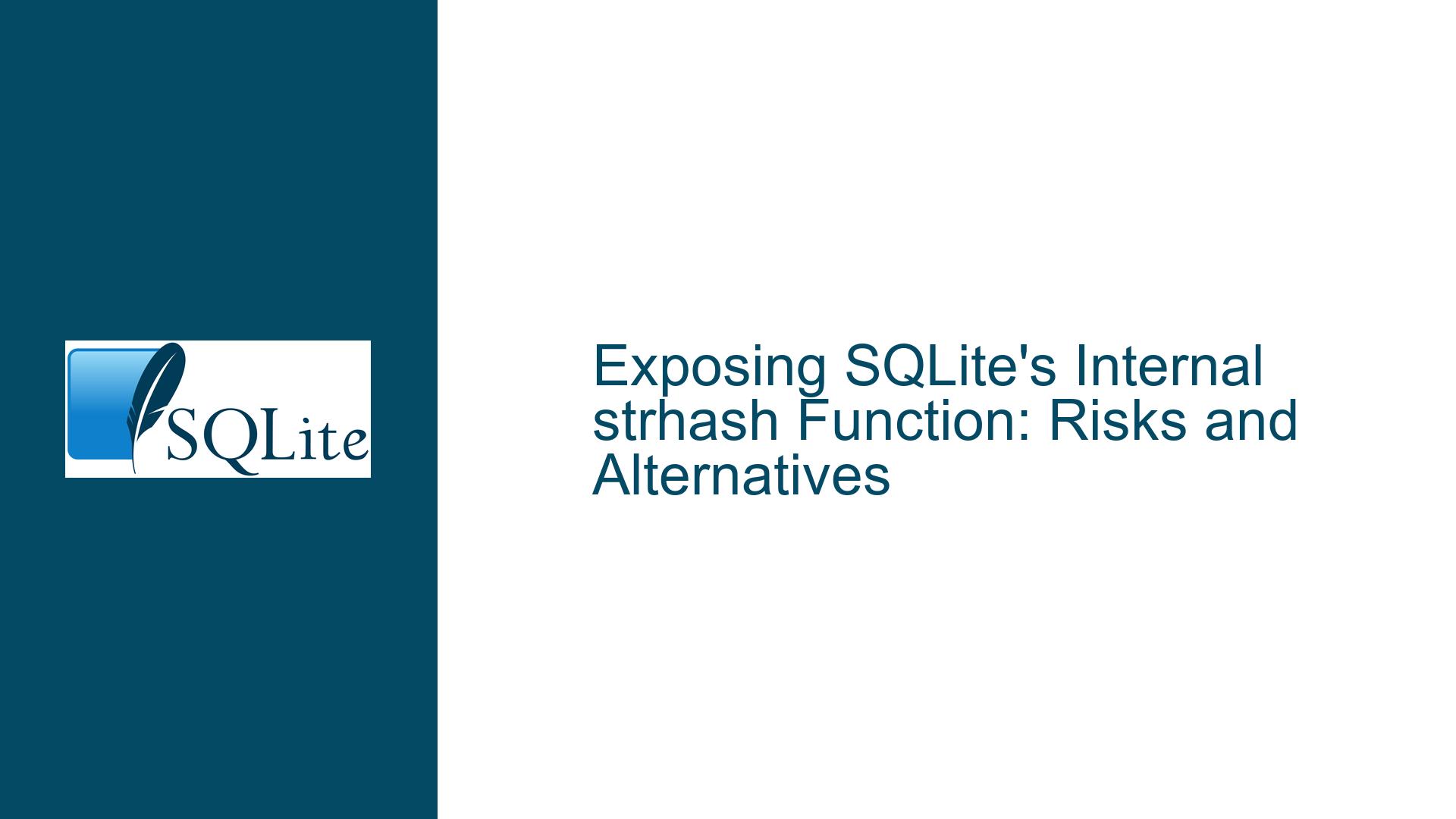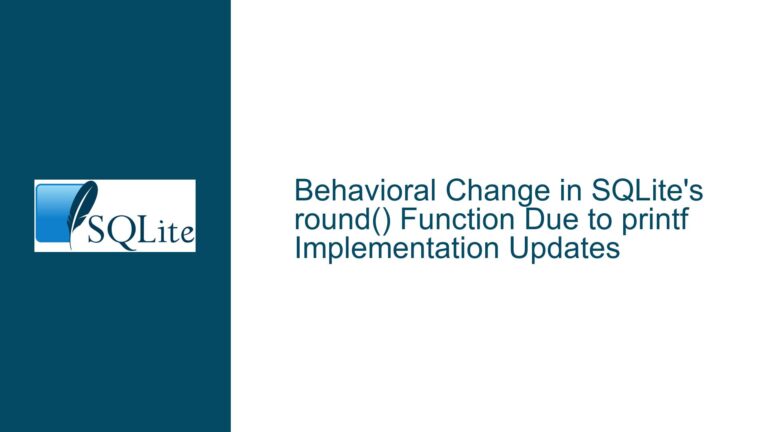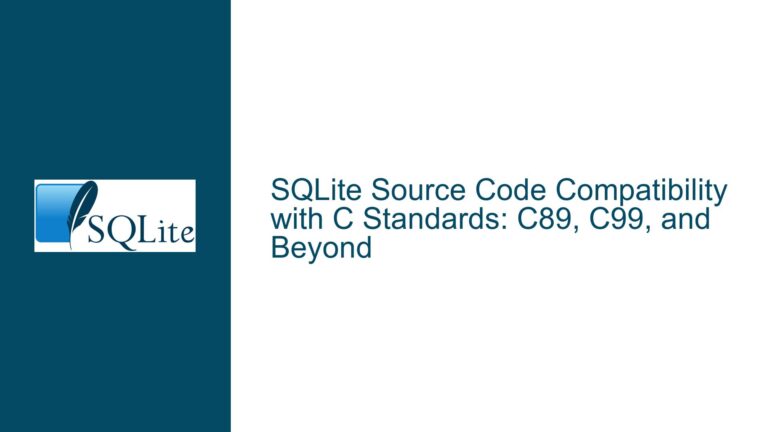Exposing SQLite’s Internal strhash Function: Risks and Alternatives
Challenges with Integrating a Built-in String Hash Function for Index Optimization
Issue Overview
The core issue revolves around the desire to expose SQLite’s internal string hashing function (strhash) as a built-in SQL function to optimize storage and indexing of large string or blob values. The proposed use case involves replacing full-text values in indexes with their hash equivalents to reduce database size and improve performance. For example, storing hashes of web page HTML content or directory paths instead of the full strings could halve the storage requirements for such indexes.
The original proposal includes a patch that adds a strhash() SQL function, which handles integers, floats, blobs, and text. This function leverages SQLite’s existing internal hashing logic, which is used for hash table lookups within the database engine. However, this approach raises critical concerns about backward compatibility, long-term maintenance, and the philosophical design principles of SQLite.
Key technical details from the discussion include:
- Internal Function Exposure: The
strhashfunction is part of SQLite’s private API, and its implementation (e.g., case-insensitive hashing, collision resistance) is tailored for internal data structures like hash tables. Exposing it as a public SQL function would freeze its implementation indefinitely, preventing future optimizations or changes to SQLite’s internal algorithms. - Hash Function Trade-offs: The proposed
strhashis lightweight but not cryptographically secure. Alternatives like CRC32, SHA1, or SHA3 are available via extensions but are criticized for being either too large (cryptographic hashes) or insufficiently collision-resistant for certain use cases. - Schema Portability and Extensions: Relying on user-defined functions (UDFs) or extensions like
sha1orsha3introduces friction when sharing databases across applications or scripts. Loading extensions requires explicit steps (e.g.,SELECT load_extension('sha1')), complicating workflows in command-line tools or automated scripts. - Security Implications: Automatically loading extensions based on schema metadata (e.g., an
sqlite_auto_exttable) could expose databases to malicious code execution if untrusted extensions are loaded.
The debate highlights a tension between SQLite’s minimalist design philosophy (prioritizing stability, backward compatibility, and small footprint) and the desire for specialized built-in functions to address niche optimization needs.
Internal Stability vs. Application-Specific Hashing Requirements
Possible Causes
SQLite’s Long-Term Support Guarantees
SQLite guarantees backward compatibility through 2050. Exposing internal functions likestrhashwould require maintaining the same hash algorithm indefinitely, even if superior alternatives emerge. For example, if SQLite’s hash tables were upgraded to use a faster or more collision-resistant algorithm, the publicstrhash()function would need to retain the old behavior, creating code duplication and maintenance overhead.Hash Function Diversity and Use Case Specificity
Different applications require different hash properties:- Collision Resistance: Indexing requires minimal collisions to avoid false matches.
- Determinism: Hashes must be consistent across sessions and platforms.
- Performance: Lightweight hashes (e.g., SQLite’s
strhash, CRC32) are fast but may lack collision resistance, while cryptographic hashes (e.g., SHA256) are slower but more robust.
SQLite cannot reasonably provide a one-size-fits-all hash function without bloating its codebase or favoring specific use cases.
Extension Workflow Limitations
While extensions likesha1orsha3are available, they are not loaded by default. Scripts or tools that interact with hash-dependent schemas must explicitly load these extensions, which complicates automation. For example, piping a database dump intosqlite3requires injectingload_extensioncalls into the input stream, as the.dumpcommand does not include extension-loading statements.Security and Malware Risks
Automatically loading extensions based on schema metadata (e.g., a hypotheticalsqlite_auto_exttable) could allow attackers to embed malicious code in databases. For instance, a crafted database might auto-load an extension that exfiltrates data or corrupts indexes.Case Sensitivity and Hash Consistency
SQLite’s internalstrhashconverts characters to lowercase before hashing, which may not align with case-sensitive application requirements. This behavior could lead to unexpected collisions if exposed as-is.
Implementing Secure, Portable Hash-Based Indexing with Extensions
Troubleshooting Steps, Solutions & Fixes
1. Use User-Defined Functions (UDFs) for Custom Hashing
Steps:
- Define a UDF in Your Application:
#include <sqlite3.h> #include <string.h> static void crc32_hash( sqlite3_context *context, int argc, sqlite3_value **argv ) { const unsigned char *input = sqlite3_value_text(argv[0]); // Implement CRC32 logic here sqlite3_result_int(context, computed_hash); } int main() { sqlite3 *db; sqlite3_open(":memory:", &db); sqlite3_create_function(db, "crc32", 1, SQLITE_UTF8, NULL, crc32_hash, NULL, NULL); // Use the function in queries sqlite3_close(db); return 0; } - Register the UDF in Scripts:
For command-line use, preload the extension:sqlite3 -cmd ".load ./crc32" database.db "SELECT crc32(data) FROM mytable;"
Advantages:
- No changes to SQLite’s core code.
- Full control over hash algorithm selection (e.g., CRC32, xxHash, FarmHash).
Drawbacks:
- Requires distributing the extension binary across platforms.
- Manual loading in scripts complicates automation.
2. Use Existing Cryptographic Extensions
SQLite’s sha1 and sha3 extensions provide robust hashing:
Steps:
- Compile the Extension:
Downloadsha1.cfrom SQLite’s source repository and compile it as a loadable module. - Load the Extension at Runtime:
SELECT load_extension('sha1'); CREATE INDEX idx_hash ON mytable(sha1(data));
Security Considerations:
- Use
SQLITE_DIRECTONLYflag to prevent remote code execution via SQL injections. - Avoid auto-loading extensions from untrusted databases.
3. Precompute Hashes at the Application Layer
Compute hashes before inserting data into SQLite:
import sqlite3
import hashlib
def compute_hash(data):
return int(hashlib.sha256(data).hexdigest()[:8], 16)
conn = sqlite3.connect('mydb.db')
conn.execute('CREATE TABLE mytable (data TEXT, hash INTEGER)')
data = "example string"
conn.execute('INSERT INTO mytable VALUES (?, ?)', (data, compute_hash(data)))
Advantages:
- Eliminates dependency on SQLite extensions.
- Enables cross-platform consistency (e.g., Python’s
hashlibvs. SQLite UDFs).
4. Use the SQLite CLI’s .sqliterc or Command-Line Options
Automate extension loading for scripts:
- Add to
~/.sqliterc:.load /path/to/crc32 - Use
-cmdFlag for One-Time Loads:sqlite3 -cmd ".load crc32" database.db <<EOF SELECT * FROM mytable WHERE hash = crc32('search_term'); EOF
5. Evaluate Alternative Hash Functions for Indexing
- CRC32: Fast but prone to collisions for large datasets.
- xxHash: Extremely fast, non-cryptographic, with better collision resistance.
- FNV-1a: Simple, lightweight, and suitable for short strings.
Example UDF for xxHash:
#include "xxhash.h"
static void xxhash32(sqlite3_context *ctx, int argc, sqlite3_value **argv) {
const char *data = sqlite3_value_text(argv[0]);
size_t len = sqlite3_value_bytes(argv[0]);
XXH32_hash_t hash = XXH32(data, len, 0);
sqlite3_result_int(ctx, (int)hash);
}
6. Mitigate Security Risks in Extension Workflows
- Sandbox Extension Loading: Restrict extensions to a trusted directory.
SELECT load_extension('/trusted_path/crc32'); - Audit Extensions: Review third-party extension code before deployment.
- Avoid Schema-Defined Auto-Loading: Do not create mechanisms that auto-load extensions based on database content.
7. Advocate for SQLite Configuration Flags (Advanced)
Propose a compile-time flag (e.g., SQLITE_ENABLE_INTERNAL_HASH) to expose strhash as a built-in function for custom builds. This would allow organizations to maintain internal forks without imposing maintenance costs on the SQLite core team.
Patch Modification Example:
#ifdef SQLITE_ENABLE_INTERNAL_HASH
FUNCTION2(strhash, 1, 0, 0, strhashFunc, SQLITE_FUNC_CONSTANT);
#endif
Conclusion
While exposing SQLite’s internal strhash function as a built-in SQL feature is technically feasible, the long-term maintenance and compatibility risks make it unlikely to be adopted upstream. Instead, leveraging user-defined functions, precomputed application-layer hashes, and secure extension workflows provides a flexible and portable solution. Developers should carefully evaluate hash function trade-offs (speed vs. collision resistance) and prioritize security when integrating extensions into their databases.






